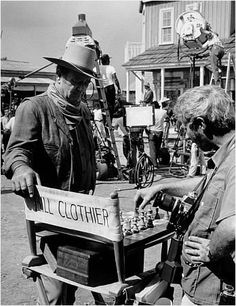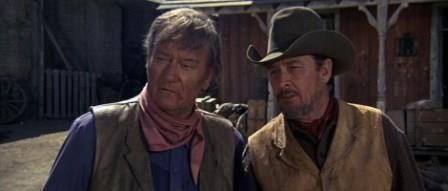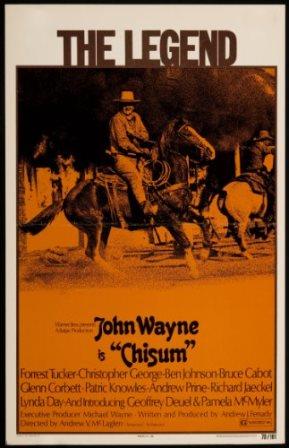We may have to be neighbors, but I don’t have to be neighborly. – John Chisum
John Wayne continued making Westerns long into his career, with even his last film being a strong entry in the genre. Prior to his finale in The Shootist however, Wayne starred in several adequate if somewhat untaxing entries. Among these is 1970’s Chisum, a film loosely based on real events and even cited by then President Richard Nixon as a favorite.
By 1970 Wayne could sleepwalk into most roles, except for the rare one which forced him to stretch a bit (such as those in True Grit or The Cowboys), and still put out a film that would perform relatively well at the box office. Chisum gives Wayne a well worn template but throws in a few 70s era twists in an attempt to make the film more relevant to a younger audience.
The results, though not stellar enough to push Chisum to rate among Wayne’s best films (Stagecoach or perhaps Fort Apache, are more than enough to keep it from being mentioned in the same breath as such films as Rio Lobo or The Train Robbers. We’ll completely exclude such atypical entries in the Wayne filmography as McQ and Brannigan.
Like most Wayne productions, he’s surrounded himself with a fine supporting cast, full of familiar faces such as John Agar, Richard Jaeckel, Bruce Cabot and Patric Knowles. For the required villain we have Forrest Tucker as mega-capitalist Lawrence Murphy.
 Behind the camera we have stalwarts in director Andrew V. McLaglen and William Clothier as director of photography. Their efforts are not wasted as Chisum looks like a classic, full of wide open vistas and chock full of most every cliche of the genre, all of which are executed well if unspectacularly. The one exception to this is the stampede in the closing, which is exceptional.
Behind the camera we have stalwarts in director Andrew V. McLaglen and William Clothier as director of photography. Their efforts are not wasted as Chisum looks like a classic, full of wide open vistas and chock full of most every cliche of the genre, all of which are executed well if unspectacularly. The one exception to this is the stampede in the closing, which is exceptional.
As good as most of the cast and the visuals are, Chisum isn’t without its flaws. Most of the 70s elements at best look dated forty years after the fact and at their worst actually harm the film. Chief among these has to be the casting of Geoffrey Deuel as Billy the Kid and Glenn Corbett as Pat Garrett.
As Wayne’s character (Chisum) fades into an almost ancillary role in the second half of the picture the film focuses much more on Deuel and Corbett, and especially the conflict Billy the Kid (Deuel) has between returning to gunfighting or settling down. Sadly, Deuel is too babyfaced to be believable as a gunman and bestowed with such goofy dialogue that he’s questionable as a love interest (for Chisum’s neice) as well. Toss in an awkward at best Glenn Campbellesque song which appears and Billy the Kid’s destruction as a character is complete. Sadly as much of the second half of the film revolves around Billy, the film loses the viewer as plausibility stumbles quite a bit. Glenn Corbett as Pat Garrett fares somewhat better, though perhaps only be comparison.
Thankfully John Wayne here seems to finally accept his age and gone from his character is any pretense at a romantic storyline, which is replaced by a paternalistic mentoring which he adopted in most of his subsequent films. Wayne’s put on a bit of weight for the film, and thankfully seems to embrace it by incorporating it into the character.
 All in all, Chisum is acceptable far, with its biggest weakness (outside of Billy the Kid), being perhaps that at times it feels like a paint by numbers set. From start to finish, it is a safe film; at times feeling like a 1960s television western. The final result isn’t unpleasing, it just feels formulaic. There’s also perhaps a few too many characters and more than one unneeded scene- most notably among these is the one where Chisum meets with the Native American Chief at the fort. It’s not a bad scene, but really serves no purpose at all in the picture (except that it does enable one to check off the ‘Native American’ box) but to further illustrate Chisum’s moral high ground. With all things Chisum related, it’s all black and white and the audience has known from the opening scene where Chisum stands.
All in all, Chisum is acceptable far, with its biggest weakness (outside of Billy the Kid), being perhaps that at times it feels like a paint by numbers set. From start to finish, it is a safe film; at times feeling like a 1960s television western. The final result isn’t unpleasing, it just feels formulaic. There’s also perhaps a few too many characters and more than one unneeded scene- most notably among these is the one where Chisum meets with the Native American Chief at the fort. It’s not a bad scene, but really serves no purpose at all in the picture (except that it does enable one to check off the ‘Native American’ box) but to further illustrate Chisum’s moral high ground. With all things Chisum related, it’s all black and white and the audience has known from the opening scene where Chisum stands.
Chisum is a big cattle rancher in territorial New Mexico who teams up with fellow rancher Henry Tunstall (Patric Knowles) to fight off the monopolistic aims of Lawrence Murphy (Forrest Tucker), who is slowly taking over the town one business at a time. The challenges build until finally Tunstall is killed by two sheriff deputies who are stooges for Murphy. Ironically, Tunstall doesn’t even carry a gun, making him perhaps the ideal fool of the film. Ultimately Chisum and Murphy have their required showdown, with Chisum coming out the victor – no real spoilers here.

As you say, Chisum didn’t tax the Duke and it doesn’t tax the audience. When it pops up on TV I find myself saying “why not?” and settling in to check on Chris George and company.
Have to agreee- many of the later Duke films fall into this category as you rather know what you’re getting into.
I have not seen this film for a very long time, but loved it when I watched it as a child. The thing I remember most is the final cattle stampede through the town.